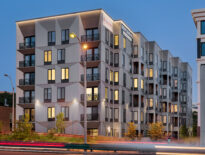An annual state-of-the-industry report by Massachusetts’ main biotech trade group is full of unwelcome news to developers, investors and lenders exposed to the state’s life science real estate market.
Headcount in the state’s life science R&D shrank by 1.7 percent last year, or over 1,100 workers, MassBio reported Monday. The state’s biomanufacturing sector also crunched down by 1.5 percent, losing 156 workers.
And the entire biopharma sector – which includes other jobs like medical testing labs – barely squeaked by without shedding workers overall, gaining only 171 workers over the course of 2024. It’s the slowest headcount growth since at least 2004, MassBio statistics said, even slower than in the depths of the Great Recession.
The big culprit: venture capitalists pulling back from what was once seen as a golden sector, MassBio said, even though the state captured 22.5 percent of all U.S. venture capital for biotech, second only to California’s 45 percent.
No other state reached 4 percent, but both Massachusetts and California also led the nation in job losses, in addition to New Jersey’s 6.7 percent drop in R&D jobs totaling 1,137 fewer jobs. California’s biotech research lost 4,634 jobs or 1.6 percent of its R&D workforce.
While deal volume in 2024 matched the prior year, total VC funding fell 17 percent, with smaller biotechs bearing the brunt of the losses, and IPO activity remained “sluggish,” MassBio said.
“This report shows how restrained funding is impacting hiring but also highlights that the Commonwealth’s longtime advantages—talent, partners, science, and infrastructure—position Massachusetts for a strong rebound once confidence returns,” MassBio President and CEO Kendalle Burlin O’Connell said in a statement. “It is important that all players in this ecosystem re-commit to doing what we do best here in the Commonwealth: translate world-class science into companies, jobs, and cures.”
The MassBio report didn’t analyze what’s happened to the state’s biotech industry in the wake of President Donald Trump’s repeated attempts to slash hundreds of billions of dollars in National Institutes of Health funding for academic and other biotech research, or raise significant tariffs on foreign pharmaceuticals. A bipartisan group of U.S. senators is pushing to preserve that funding in the upcoming federal budget, but industry experts say the uncertainty Trump has injected into the industry has caused some research projects to wind down and made it hard for many others to operate.
But a May report from the group said “biopharma may choose to reduce focus on early-stage research in current uncertain environment,” reducing demand for lab space.
“Funding from the National Institutes of Health (NIH) is the lifeblood of Massachusetts’s biomedical ecosystem. At Boston Children’s, federal research investments have enabled our scientists to pioneer breakthrough treatments for childhood diseases while training the next generation of medical innovators. This funding doesn’t just advance pediatric care — it sustains Massachusetts’s position as the global epicenter for life sciences innovation,” Boston Children’s Hospital CEO Dr. Kevin Churchwell said in a statement provided by MassBio.
Second-quarter research by commercial brokerage Colliers offers a glimpse of life science real estate’s plight.
Between deliveries of spec-built space and existing tenants either giving back space or putting leased lab benches and offices up for sublease, the Greater Boston life science market has seen almost 600,000 square feet of negative absorption between January and June of this year. The overall vacancy rate sat at 29.7 percent, Colliers reported, with 13.4 million square feet of lab space .
That vacancy rate is expected to keep increasing in the near term. Roughly 643,000 square feet of brand-new space delivered in the second quarter without tenants in place, Colliers said, with another 3 million square feet or so under construction.
While the fact that only 40 percent of that under-construction space has yet to be preleased may sound promising, Colliers researchers wrote that most of those leases reflect moves to newer buildings, not expansions – they’ll likely lead to new vacant blocks appearing in older buildings.
And the $3.3 billion in VC funding that Massachusetts biotechs landed in the first half of 2025 “marked the slowest two-quarter period in the post-COVID era,” Colliers’ second-quarter research report said.
Some unbuilt lab projects, like Bullfinch’s Muzi Ford site in Needham, are being dropping their lab components in favor of housing or are being resequenced to enable a project’s housing component to start construction first.







